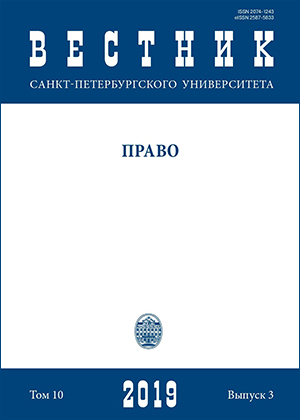The Conceptual Basis of the Priority of the Authorized Agency Compared to Creditors in Bankruptcy: A Generalization of the International Experience of Regulation of Fiscal Relation in Cases of Bankruptcy of the Taxpayer
DOI:
https://doi.org/10.21638/spbu14.2019.306Abstract
The subject of the study is the relation between tax legislation and bankruptcy legislation. The selected theme is seen sporadically in the analysis of certain issues in the framework of regulating legal relations arising in bankruptcy cases. The object of our study will be the public relations arising in the performance of the organization of tax liabilities of the bankrupt at the expense of property, including property pledged as collateral. Our objective was to attempt to overcome the existing gap in the legal regulation of the status of an authorized body as a mortgage lender, filling in the gaps in national law and harmonizing it with the legislation of other nations. In addition, the present work highlights the prospects of setting tax issues in cross-border bankruptcy cases on the example of the BRICS countries. We formulate the basic contradictions in the ratio of priority tax claims in the federal law of BRICS countries, assess the situation, direct state involvement in bankruptcy cases in other states, and outline ways of overcoming problems. The work used the comparative method in accordance with examples of cross-border bankruptcies that the national bankruptcy legislation adopted in BRICS countries. A proposal is made for granting the competent authority the same rights of secured creditors if the requirements about payment of obligatory payments are secured by a pledge of property of the taxpayer. The author also confirmed the divergence of national legislation on the ranking of creditors in some of the BRICS countries. In addition, we provide preconditions for the participation of the competent authorities of some countries in proceedings instituted in the territory of the other BRICS countries. The author made recommendations for the improvement of tax legislation and bankruptcy law which will also ensure the fiscal interests of the state.
Keywords:
insolvency, cross-border insolvency, tax issues, obligatory payment, competition of international claims, equality of rights, authorized agency, the lender, the security of property, priority of claims
Downloads
References
Downloads
Published
How to Cite
Issue
Section
License
Articles of "Vestnik of Saint Petersburg University. Law" are open access distributed under the terms of the License Agreement with Saint Petersburg State University, which permits to the authors unrestricted distribution and self-archiving free of charge.






